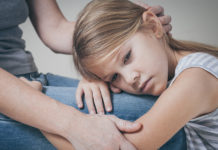Omega-3 Fatty Acids May Help Prevent Transition to Psychosis
“When people with early-stage symptoms took omega-3 supplements for three months, they had much lower rates of progression than those who did not,” according to research out of Australia covered in this month’s issue of the New Scientist.
Clinton Releases Mental Health Plan
Today, Hillary Clinton’s campaign released their plan for addressing mental health care in the United States. The plan calls for a full integration of...
Emotional Child Abuse Just as Harmful as Physical Abuse
Different types of child abuse have equivalent psychological effects, according to a study in JAMA Psychiatry. It has previously been assumed that emotional and verbal abuse could have different or less harmful impact on a child’s psychology than physical or sexual abuse, but research now suggests that these forms of abuse can be just as damaging.
Study Finds Connection Between Trauma and Psychosis in Children
Researchers connect the impact of early trauma to the development of psychosis in children as young as 7 years old.
Minority and Immigration Status Associated with Psychosis Risk
Ethnic minorities and those who migrated during childhood have an elevated risk for psychosis, study finds.
More Evidence That Physical Activity Prevents Depression
Higher levels of physical activity serve as a protective factor for the future development of depression.
Omega-3 Screening for Psychiatric Symptoms?
There is a substantial body of evidence suggesting that not getting enough omega-3 fatty acids in your diet may be connected to a diverse array of psychiatric symptoms. In a new study published this month, psychiatrist Robert McNamara and Erik Messamore provide an overview of the evidence and call for screening of omega-3 deficiency in people experiencing symptoms associated with ADHD, depression, mood disorders, and psychosis.
“New Plan to Treat Schizophrenia Is Worth Added Cost, Study Says”
Benedict Carey of the New York Times reports on the success of new schizophrenia and psychosis programs that provide family counseling and job and...
“Generation Meds: the US Children Who Grow Up on Prescription Drugs”
“In America, medication is becoming almost as much a staple of childhood as Disney and McDonald’s,” writes Sarah Boseley in the Guardian. In this piece photographer Baptiste Lignel follows six boys and girls to examine the long-term effects of these drugs.
Children with ‘ADHD’ Commonly Prescribed Antipsychotics
Despite little evidence for benefit, and substantial risk of harm, antipsychotics are commonly prescribed to children diagnosed with ADHD
Are Students Benefiting From the Growth Mindset Model?
Results from two meta-analyses reveal shortcomings with the growth mindset theory as applied in schools.
“Misuse Of ADHD Drugs By Young Adults Drives Rise In ER Visits”
"It's no secret that stimulant medications such as Adderall that are prescribed to treat symptoms of ADHD are sometimes used as 'study drugs' aimed...
What Are Best Practices For Psychosis And What Gets In The Way?
Research investigates clinicians’ perspectives on best care practices and the complicated realities of providing care in the face of agency limitations and mechanized interventions.
We Need to Talk About Frankie
In this piece for The Cut, Dyan Neary details the story of Frankie Perry, a man whose life was forever altered by being prescribed an...
The Connection Between Sleep, Exercise, Screen Time and Cognition in Childhood
Can current guidelines for sleep, exercise, and screen time in childhood be linked to positive cognitive outcomes?
Safety Analysis Weighs Harms and Benefits of Antipsychotic Drugs
The researchers find that the drug effects for reducing psychosis are small and that treatment failure and severe side effects are common.
Addressing Depression and Heart Disease with Exercise and Physical Activity
A new study examines the effects of midlife exercise on depression and cardiovascular health later in life.
Food Insecurity Linked to Mental Health Globally
Global analysis of 149 countries finds food insecurity is associated with poorer mental health.
Belongingness Can Protect Against Impact of Trauma, Study Suggests
A new study explores feelings of belongingness as a protective factor for childhood trauma and adult mental health outcomes.
Adderall Use Associated with Increased Risk of Psychosis
Twice as many teenagers with ADHD experienced severe psychosis when taking Adderall, as compared to Ritalin, according to a new study.
Watch: “I Hear Voices in My Head, But I’m Fine”
"Eleanor Longden started hearing voices when she was 18. She was drugged and hospitalised, then told she was schizophrenic. A psychiatrist even told her...
The Unsung Psychiatric Impact of Strep Throat
A sea change is needed in the evaluation of children with perceived psychological disturbances. Parents are told that their child has a fictitious biochemical imbalance in the brain while real medical disorders are overlooked. In our family's case, it was Pediatric Autoimmune Neuropsychiatric Disorder Associated with Strep (PANDAS).
Researcher Critically Examines Movements for Global Mental Health
China Mills raises concerns that global mental health movements obscure social determinants of health and naturalize Western mental health concepts.
“Cortisol Levels in Children’s Hair May Reveal Future Mental Health Risk”
The Guardian covers research out of Australia that found that levels of the “stress hormone” cortisol in the hair of 70 nine-year-old children corresponded to the number of traumatic events experienced by the child. “Childhood is an imperative and sensitive period of development, and when things go wrong it can have lifelong consequences, not just on mental health, but also on general health.”
Study Investigates Long-Term Effects of Social and Emotional Learning Programs
Social and Emotional Learning (SEL) programs have gained popularity in U.S. schools in recent years. A new study examines the nature and longevity of their impact on students.


























